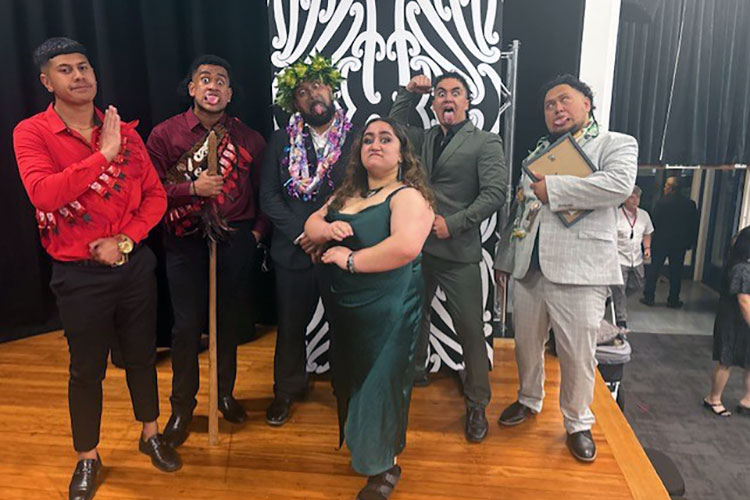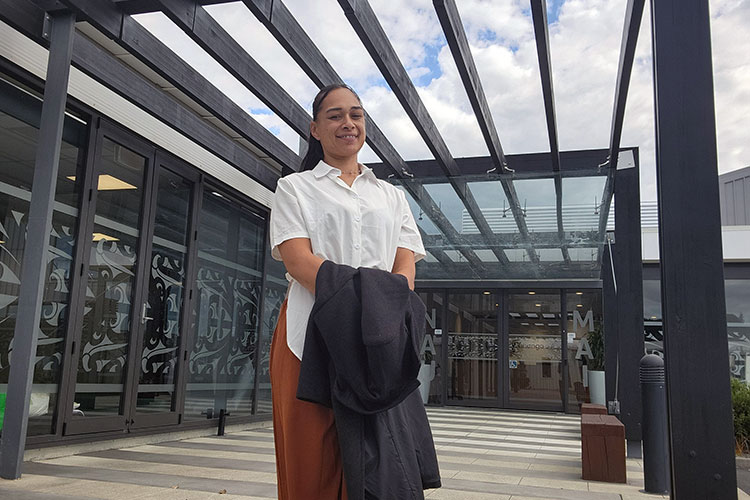Learning the art of raranga may not seem like a life-changing activity, but for recent graduates Toni Kakau and Zelda Te Pairi, this practice has been exactly that.
Both tauira received their tohu for Maunga Kura Toi level 7 at Te Wānanga o Aotearoa in May and acknowledge they have been healed by learning raranga.
Toni says, “A few years back, I was head deep into addiction and alcoholism. And through raranga, I pulled myself out. There is so much healing in it. I'm hitting 5 years sobriety this year.”
Zelda has had struggles with her mental health, confessing, “I wouldn't go anywhere on my own. My mental health had locked me in my house. Coming to class was my only outlet apart from my therapist.”
These close friends have been studying together for the last 4 years at Waiwhero campus in Rotorua and their shared belief in the healing nature of learning raranga is now guiding them towards new endeavours.
Toni wants to become an art therapist for Māori to bring them back from mental health issues, or drug and alcohol addictions.
“I know that if it works for me, it's going to work for other people. It has been a journey for me, but if this is where the end brings me, then I'm more than happy to take that journey,” she says.
With no known weavers in her whānau, Zelda started expanding her awareness via books and her kaiako, and eventually established a connection with one of her kuia from Murupara who was able to help with iwi knowledge and make connections with other local weavers. Together they created a rōpu named Pono and started holding raranga classes on their local marae.
“Sadly, Nanny Ngahaka passed away over Easter this year, but I need to carry on. I have her notes and recordings from my time spent with her. I have learnt that being a kairaranga, makes you a whangai in a larger whanau. My connection to my iwi, hapu and marae are deeper and stronger now than ever.”
They are in agreeance that raranga takes you on a personal journey. They are both grateful for what raranga has given them.
Toni says, “It’s a lot of soul searching and gaining understanding about yourself. I think we’ve come out nicer people.”
Zelda adds, “If your mahi is not looking right, something in you isn’t sitting right. So, you have to deal with that thing to get your mahi right.”
Toni and Zelda describe their bond – and with their fellow tauira – as akin to sisters.
“We all came in quite broken in one way or the other. I think we all came in not knowing anything about it (raranga). We drew off each other, we learned from each other, and we talked.”
For much of their learning, they have had kaiako Tracey Robens.
“Our kaiako have been so influential in our practice. They believe in the kaupapa, they live it, and then we pick it up. I don't think there's a lot of places where I would go and give my blind faith. But I do because I know that because of their principles and their values, they're not going to steer me in the wrong direction”, says Toni.
Zelda adds, “Te Wānanga o Aotearoa got me so excited about learning again. No matter what, anytime we had a question, our kaiako were there to answer, even outside of their work time. You don't get that anywhere else.”
Find out more about our Toi Māori (Arts) programmes.




































